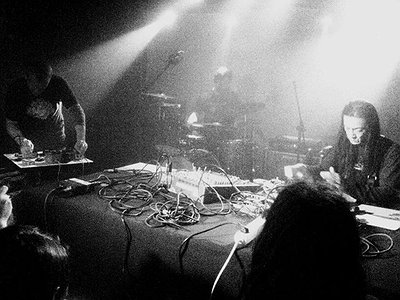The relationship between music and other forms of art – painting, video art and cinema most importantly - has become increasingly important. How do you see this relationship yourself and in how far, do you feel, does music relate to other senses than hearing alone?
In the early period of Lowest Music & Arts activity, the artwork including flyers, advertisements and all other printed materials were really important for presenting my music. It was crucial that music and visuals associated well. They had to make sense as one complete art form because it was a set of work to make music, design the cover and print it, then pack and ship. Also I had a strong connection with the network of Mail Art. Nowadays, I go with mass production systems, but basically I have been trying to maintain the DIY concept for my musical production. This DIY always gives me a joy, the pleasure of creation.
There seem to be two fundamental tendencies in music today: On the one hand, a move towards complete virtualization, where tracks and albums are merely released as digital files. And, on the other, an even closer union between music, artwork, packaging and physical presentation. Where do you stand between these poles?
I understand and tolerate these two aspects of today's music business. Actually I'm not very positive about releasing my music in the form of digital files, but the fact is, I sell my work via downloads and use file transfer systems frequently in the production process. As I was saying before, the exciting part of making art, for me, is DIY. In that sense, the concept of physical and digital do not conflict with each other. It's so natural to accept technology on-going now.
The role of an artist is always subject to change. What's your view on the (e.g. political/ social/creative) tasks of artists today and how do you try to meet these goals in your work?
I think it's a wrong to consider opinions of artists as having some special meaning. Let's face it, some artists' statements are really barnacles. I myself agreeing to the idea of Vegan Straight Edge Animal Rights, and have been claiming the validity of the idea. I believe in it. So, when I see some contemporary artists calling their animal-abuse work as an art, I would be against it strictly.
Also I hate some heavy metal artists affirming violence as Satanism and taking idiotic acts called animal sacrifice on blind faith, laying dead bodies of animals on their stage. Domesticating animals and depriving their rights, abusing and killing them is speciesism, and I take it as evil like racial discrimination or gender segregation.
Music-sharing sites and -blogs as well as a flood of releases in general are presenting both listeners and artists with challenging questions. What's your view on the value of music today? In what way does the abundance of music change our perception of it?
We can pretty much find everything on internet in a flash. Globalisation and informatisation is making it possible. Let's say, there was a tune you really wanted to listen to and you have been looking for it in every possible ways for decades but you never have been successful. But now, the technology allows you to Google it in a second and you can find it and download it for free. How great is that?
On the other hand, you can also find overpriced worthless records online. Someone clever is manipulating the information. I think there should be a way to increase the diversity of music distributed and circulate unique, individual non-mainstream music at reasonable prices. It doesn't matter what format you get a tune and listen to it. You can go out and look for albums in a record shop - like good old days, going to concerts and experience or listen to your favourites on phone. The audience can choose the way they listen.
How, would you say, could non-mainstream forms of music reach wider audiences?
It's kind of impossible, I think. But why should non-mainstream music reach out to wider audiences? These days, everything is diversified and it's OK to have many different non-mainstream musics for non-mainstream music lovers, rather gaining wider audiences.
Usually, it is considered that it is the job of the artist to win over an audience. But listening is also an active, rather than just a passive process. How do you see the role of the listener in the musical communication process?
I am a big collector of records and I believe my work is the consequence of listening experiences. But some artists don't listen to others' music and some are not collectors. There many different types of musicians. So, one can't distinguish what the roll of listeners are. Listeners have compete freedom, they should do what they want to do.
Reaching audiences usually involves reaching out to the press and possibly working with a PR company. What's your perspective on the promo system? In which way do music journalism and PR companies change the way music is perceived by the public?
Everybody knows how media works and what promotions are. People aren't stupid, no-one would swallow myth manufactured by the media. If one can reach the information he wants, that's good enough. No one takes CD reviews on Amazon seriously. Reviews are by amateurs or maybe comments created by a stealth marketer. I don't have any idea about what kind of PR would be affective or how to reach out to the people the most.
Picture by Pandi Gustafsson.
Read and hear more MERZBOW at merzbow.net



